|
 Home
Page Home
Page
 The
Concept of Allah (God) The
Concept of Allah (God)
 What
is Islam? What
is Islam?
 Main
Pillars of Islam Main
Pillars of Islam
 Muslim
World Population Muslim
World Population
 The
Universal Religion The
Universal Religion
 Muhammad
(Peace Be Upon Him) Muhammad
(Peace Be Upon Him)
 Relevance Relevance
 Women
in Islam Women
in Islam
 The
Concept of Peace and War The
Concept of Peace and War
 Tolerance
in Islam Tolerance
in Islam
 Islam
and Cleanliness Islam
and Cleanliness
 Other
Religions Other
Religions
 Islam's
contribution to Humanity Islam's
contribution to Humanity
 Islam
and Knowledge Islam
and Knowledge
 Human
Rights in Islam Human
Rights in Islam
 History History
 sources sources
 Favourite
Links Favourite
Links
 Photo
Album Photo
Album
 About
Us About
Us
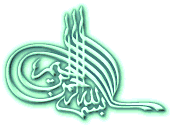
- Decorative Arabic writing
says:
- In the Name of God
- Most Compassionate
- Most Merciful
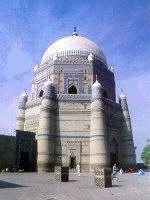
Islamic Centre
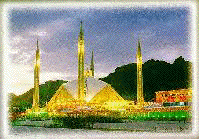
Modern Mosque
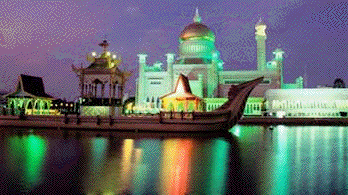
Modern mosque - China
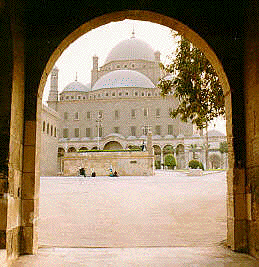
Muhammad Ali Mosque - Cairo
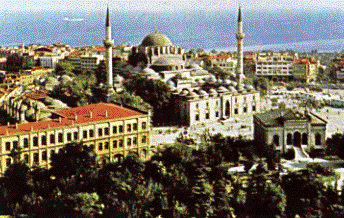
Aya Sofia - Turkey
|
- Seeking
knowledge is obligatory in Islam for every Muslim,
man and woman. The main sources of Islam, Qur'an
and Sunnah (Prophet Muhammad's traditions),
encourage Muslims to seek knowledge and be scholars since
this is the best way to lead people to know Allah
(God) and to lead a happy and sound life.
-
- Muslims were,
therefore, eager to seek knowledge, and within a few
years of Muhammad's mission, a great civilisation
sprang up and flourished. The outcome is shown in the
spread of Islamic universities; Al-Zaitunah in
Tunis, and Al-Azhar in Cairo go back
more than 1000 years and are the oldest existing
universities in the world.
-
- Muslims made great
advances in many different fields such as geography,
mathematics, medicine, architecture, literature, and
astronomy.
- Algebra and
the Arabic numerals were introduced to the world
by Muslim scholars. The astrolabe, the quadrant, and many
navigational maps were developed by Muslim scholars and
played an important role in the world progress, most
notably in Europe's age of
exploration.
-
- Muslim scholars
studied the ancient civilisations from Greece to
China then added their own creative ideas and
inventions, and finally transmitted this new knowledge to
Europe, as well as other places.
-
- In
Medicine
-
- In Islam,
the human body is a source of appreciation as it is
created by Almighty Allah (God). How it
functions, how to keep it safe, how to prevent
diseases from attacking it have been important issues
for Muslims.
-
- Prophet
Muhammad himself urged people to
"Do take
medicines for your
diseases", as
people at that time were reluctant to take medicines.
He also said
"God created no
illness but established for it an antidote, except old
age. When the antidote is applied, the patient will
recover with the permission of
God."
-
- These were strong
motives to encourage Muslim scientists to explore,
develop, and apply empirical laws. Much attention has
been given to medicine and public health care: the
first hospital was built in Baghdad in 706
AC. The Muslims also used their camels as mobile
hospitals which moved from place to place in a caravan
style.
-
- Muslim scholars
used human corpses, skulls, and skeletons in order to
help their students understand how the body functions.
This enabled surgery to develop very
quickly.
-
- Al-Razi
(930) was the greatest physician in the world in
the middle ages. Khalaf Abul Qasim Al-Zahrawi
was a very famous surgeon in the eleventh century.
Ibn Sina (1037) wrote his famous book
(Al-Qanun Fi Al-Tibb) which remained a standard
textbook for over 700 years.
-
- In
Geography
-
-
- Muslim scholars
paid great attention to geography. Al-Muqdishi,
for example, was the first geographer to produce
accurate maps in colours. This helped a lot of people
all over the world to get a clear and better
understanding of the globe.
-
- In 1166,
Al-Idrisi, a well-known Muslim scholar, produced a
world map including all the continents with their
mountains, rivers and famous cities.
-
- In fact, Muslims'
great concern for geography is due to their religion.
Islam encourages people to travel through the
whole earth to see God's signs and patterns
everywhere. Islam also requires each Muslim to
have some background in geography. For example, one
should know the direction of "Qiblah" in order
to make prayers five times a day. This means that
he/she should be able to find the four directions
north, south, east and west. Muslims also were used to
taking long journeys for conducting business as well
as for spreading their religion.
-
- They took every
opportunity to explore the whole world with adequate
geographical information.
-
- In
Astronomy
-
-
- Muslim's have a
special interest in astronomy. The moon and the sun
are of vital importance in the life of every Muslim.
By the moon, Muslims can determine the beginning and
the end of every month. By the sun the Muslims can
calculate the different times of prayer. At the same
time, the Qur'an contains many references to
astronomy.
-
- The heavens and
the earth were ordered rightly, and were made
subservient to man, including the sun, the moon, the
stars, and day and night. Every heavenly body moves in
an orbit assigned to it by God and never
digresses, making the universe an orderly cosmos whose
life and existence, diminution and expansion, are
totally determined by the Creator.
- (Qur'an, 30:22)
-
- In
Mathematics
-
-
- It is very
interesting to know that Islam, unlike other
religions, urges mankind to search and explore the
universe. For example, the Holy Qur'an
states:
-
- We
(Allah)
will show you
(mankind)
our signs/patterns in the horizons/universe and in
yourselves until you are convinced that the revelation
is the truth.
- (Qur'an,
14:52)
-
- This invitation to
explore and search made Muslims interested in
astronomy, mathematics, geometry, and other
sciences.
-
- The Muslims
invented the symbol for zero (The word "cipher" comes
from Arabic sifr). They also organised the numbers
into the decimal system. Additionally, they invented
the symbol to express an unknown quantity, such as
variables like x, or s.
-
- The Muslims had
very clear and firm understanding of the
correspondences among geometry, mathematics, and
astronomy.
-
- Moreover, it was
the Muslims who founded the science of Algebra
(Al-Jabr). The famous scholar Al-Khawarizmi
(850), was able to make and describe algebraic
calculations.
-
- Not only did
Muslims make these discoveries and inventions, but
they also transmitted them to Europe through
Spain.
-
-

|


![]()